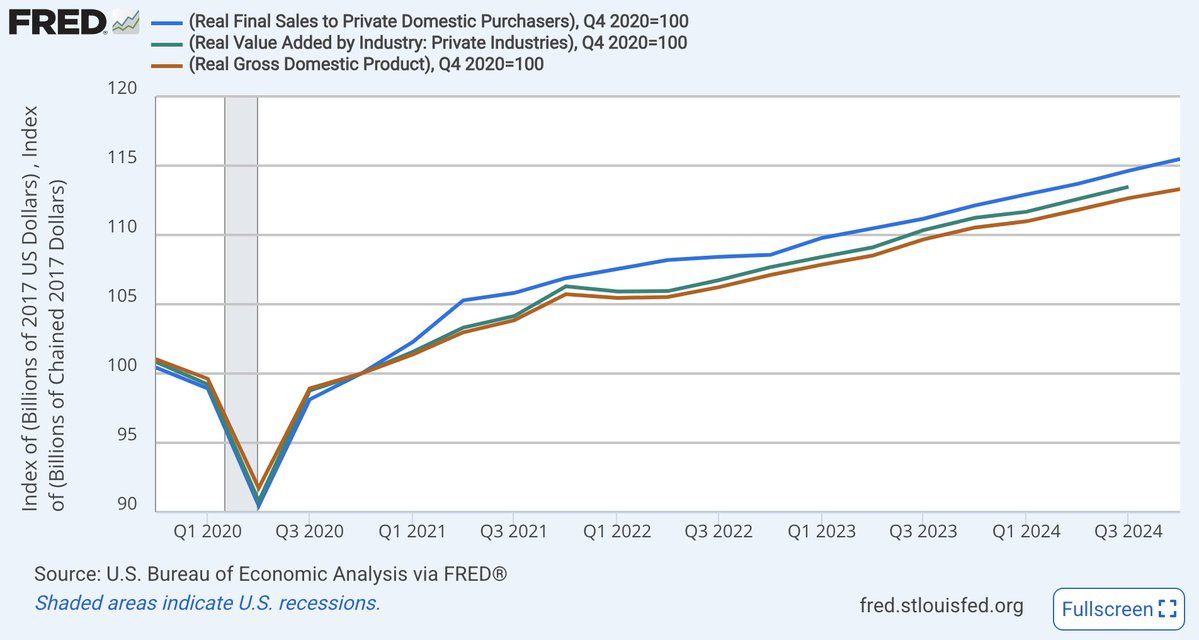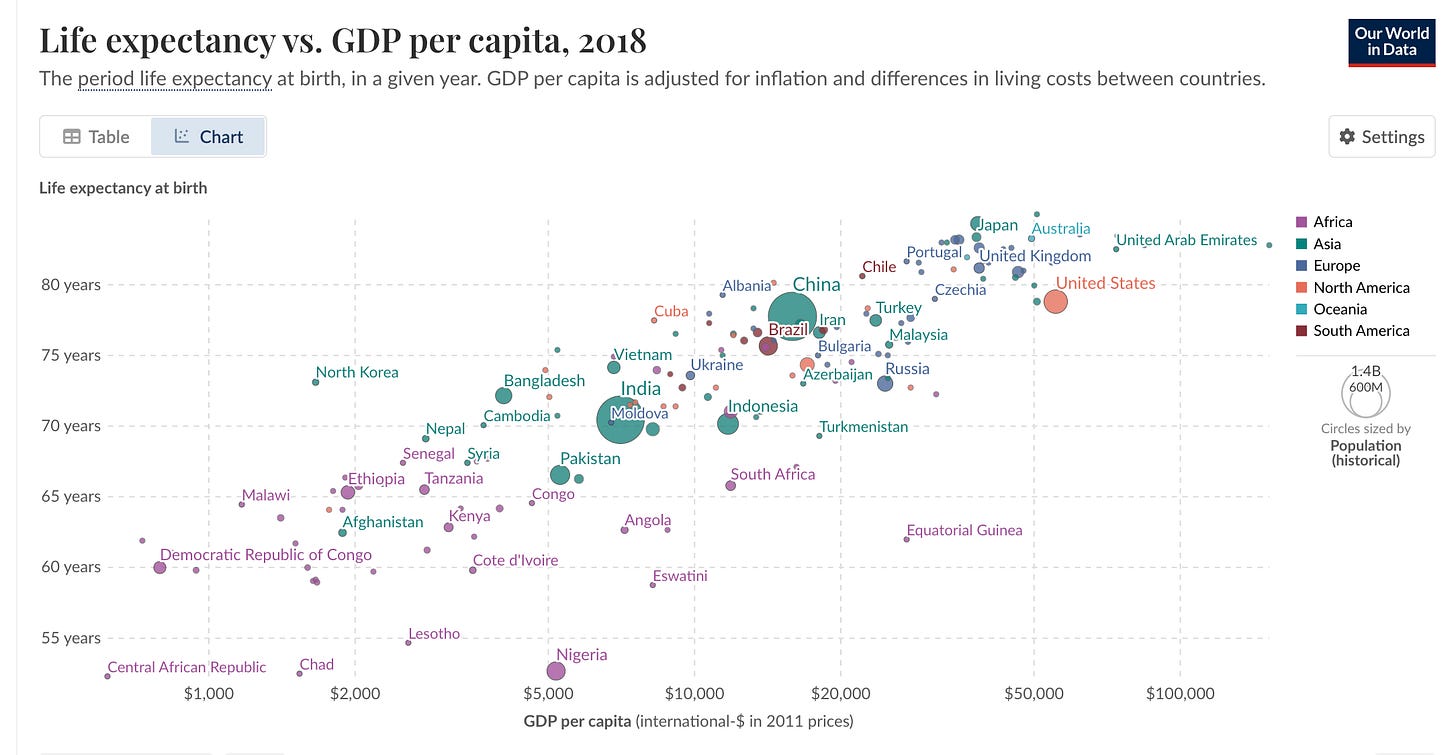GDP is a good measure. Don't mess with it for political reasons.
Removing government production from GDP Is a terrible idea
Trump administration officials apparently are floating the idea of removing government production from GDP calculations. Commerce Secretary Howard Lutnick claimed Sunday that “governments historically have messed with GDP,” suggesting he’ll “separate those two and make it transparent.” Meanwhile, Elon Musk argued that “a more accurate measure of GDP would exclude government spending.”
Let’s put aside Musk’s confusion about what GDP includes—it’s government production—goods and services actually produced—not spending, which is mostly transfers like Social Security payments. Defining GDP to now be “GDP - G” is a truly terrible idea.
GDP Measures Total Production, Not Just Markets
Let’s be clear. The Bureau of Economic Analysis (BEA) tells us that GDP “measures the value of the final goods and services produced in the United States (without double counting the intermediate goods and services used up to produce them).” You may read “value” to be the giveaway, but it is really “market value” or “market sales.” GDP isn’t meant to measure consumer surplus—it measures a country's total economic production.
The key concept is that GDP measures final output. It doesn’t matter who buys that output—consumers, businesses, the government, or foreigners. As long as it’s a final good or service produced domestically, it counts.
Government spending represents real economic activity involving real resources, producing goods and services that actually exist in the economy. When a government builds a highway, purchases military equipment, or pays teachers, these activities create actual economic value—whether you personally value them or not.
Just Another Misguided GDP Critique
The new proposal fits into that long history of GDP critiques that misunderstand the metric’s purpose. For decades, critics have pointed out that GDP doesn’t capture unpaid housework, volunteer activities, or leisure time—all valuable aspects of society. Others note that GDP includes things that aren’t necessarily beneficial, like cigarette production or cleanup after natural disasters. It’s amusing to see this politically-motivated attack on GDP coming from the right, when it’s usually leftists dismissing GDP as a “capitalist metric” that ignores environmental destruction and inequality.
These observations aren’t completely wrong. That’s a low bar to clear. Yes. GDP has blind spots. But that doesn’t mean we should arbitrarily remove components we don’t like.
The housework critique is actually instructive here. Yes, GDP omits the economic value of unpaid household labor. But the solution isn’t to try to add in household labor whenever we’re in a recession, and more people are doing work at home. Rather, economists understand GDP’s limitations and supplement it with other measures when analyzing household production.
Similarly, government spending may not reflect consumer preferences the way private spending does, but it certainly represents real production using real resources. Removing it wouldn’t make GDP more “accurate”—it would make it fundamentally incomplete.
We Already Have This Measure
Here’s the most bewildering part of this proposal: we already have exactly what these officials are suggesting. The BEA regularly publishes measures of private sector output that exclude government spending. The BEA publishes this data alongside GDP in its national accounts. Anyone who wants to track private sector performance separately from government activity can already do so.
In fact, economists routinely analyze these metrics to understand the relative contributions of the private and public sectors to economic growth. Financial analysts use them to evaluate market performance independent of government fiscal policy.
The existence of these established measures makes Musk seem particularly uninformed. Rather than inventing a new, politically motivated metric, we already have purpose-built tools for analyzing private sector activity. Creating a new "GDP minus G" would be redundant at best and misleading at worst.
The strangest part of this proposal is that it would make Biden's economic performance look better, not worse. If you removed government spending from GDP, the Biden economy would appear stronger! (HT: Mike Konczal)
This illustrates why changing measurement tools for political reasons is so dangerous. It’s so short-sighted.
The Dangerous Threat to Statistical Agencies
The proposal to remove government spending from GDP represents something far more troubling than just a misunderstanding of economic measurement. It signals a potential assault on the integrity of our statistical agencies and the objective economic data they produce.
America’s statistical agencies—the Bureau of Economic Analysis, Bureau of Labor Statistics, and Census Bureau—have developed world-class expertise over decades. These institutions employ thousands of career economists, statisticians, and data scientists who have dedicated their lives to improving our understanding of the economy through careful measurement.
These experts have built sophisticated methodologies for everything from seasonal adjustments to imputations for missing data. They’ve developed nuanced approaches to measuring complex phenomena like the digital economy, quality improvements in goods and services, and the value of owner-occupied housing. This institutional knowledge represents an irreplaceable national asset.
Political interference with these measurement standards doesn’t just damage one number. It risks:
Erosion of international comparability. GDP is measured according to international standards that allow for meaningful comparisons across countries. Unilateral American changes would make our statistics incomparable with the rest of the world.
Undermining business and policy planning. Companies, investors, and policymakers rely on consistent, accurate economic data to make decisions. Arbitrary changes create uncertainty that ripples through the entire economy.
Setting a dangerous precedent. Once we start modifying economic statistics for political reasons, where does it stop? Future administrations might feel emboldened to further manipulate other economic indicators like inflation, unemployment, or poverty rates.
Brain drain of specialized talent. When political appointees override professional judgment, career experts often leave. The specialized knowledge of how to construct accurate economic statistics could be permanently lost.
Argentina’s experience is instructive. When its government began interfering with inflation statistics in 2007, the country’s statistical agency lost credibility, international organizations stopped using its data, and economic decision-making suffered throughout the economy. We should avoid going down this dangerous path.
GDP Isn’t Perfect, But It’s Too Vital to Mess With
GDP has endured because, at its core, it captures the fundamental essence of economic output—the total monetary value of final goods and services produced. Attempts to radically depart from that basic formula often end up correlating strongly with GDP anyway, which suggests they haven’t escaped its gravitational pull.
For example, some argue we should focus more on measures of well-being, happiness, or social progress rather than raw economic output. Those are worthy goals, but they tend to go hand in hand with GDP growth over the long run.
Richer countries score higher on the UN’s Human Development Index, which factors in life expectancy and education alongside GDP per capita. They also tend to have higher self-reported levels of life satisfaction. As economies grow and develop, living standards and quality of life tend to rise across a variety of metrics.
That’s not to say GDP is destiny or that it captures everything we care about. But GDP, for all its flaws, reflects something powerful and elemental about how economies work and grow. Proposals like removing government spending from GDP calculations are political gimmicks, not earnest attempts to forge better tools.




Obviously, GDP calculation shouldn't be changed in order to keep comparability.
That said, something like the Measure of Economic Welfare by Nordhaus and Tobin, suitably modernised, should become the main focus of political discussion. It is true that GDP is an extremely strong correlate of the things we actually care about, but we should do what we can to make even more accurate measures, the difference between real and measured welfare might be quite significant at the margin of policy optimization.
With respect to government spending, this goes in the opposite direction to what we'd like to see. Because GDP values government services only at input cost, it systematically underweights the value of government services to consumers.
What's "the BEA"?